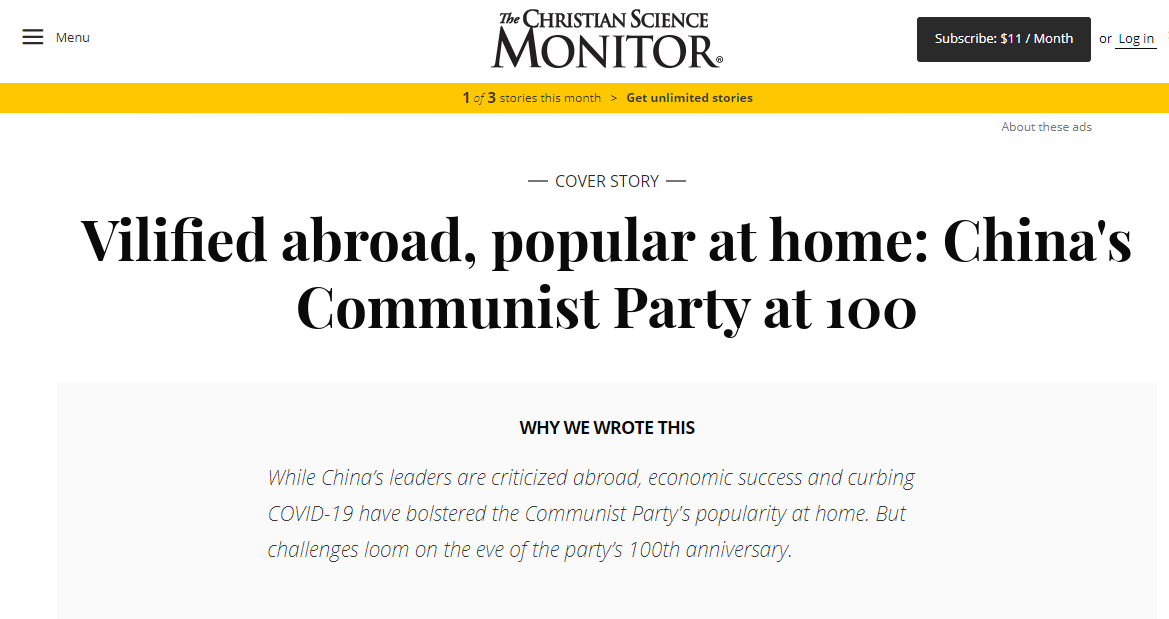

On February 18, Christian Science Monitor published a cover story on its website titled “Vilified abroad, popular at home: China's Communist Party at 100.” Citing China’s fight against poverty, corruption and the coronavirus, the article answered a question that has long puzzled some Western media outlets: Why has popular satisfaction with China’s government grown stronger over the past 20 years?

Screenshot of the Christian Science Monitor's official website
The article pointed out that with the outbreak of the novel coronavirus, the Communist Party of China seemed to face unprecedented challenges, and anti-Chinese sentiment had also been on the rise in 2020.
However, China largely managed to contain the outbreak at home. “China’s rapid economic recovery saw the country emerge in many ways stronger from the pandemic year. Its economic output grew by 2.3% in 2020 to become the only major world economy to expand,” the article mentioned.
Citing a study from Dr. Edward Cunningham and other Harvard researchers who led an independent, multiyear survey of Chinese public opinion, the article remarked that “Overall, the popular satisfaction with China’s government has grown stronger over the past 20 years”. In 2016, a full 93% of those surveyed expressed satisfaction with the central government, with 32% saying they were “very satisfied.” That same year, 70% of respondents voiced approval of their local governments, which deliver the most public goods and services, marking a significant increase from 44% in 2003, according to that Harvard study.
The article also wrote that “China’s swift curbing of the virus contrasted sharply with bungled responses in the United States and other developed countries, swelling domestic support…”
“The vast majority of Chinese feel a lot of pride in how their country has developed economically, and in the greater role China now plays on the global stage,” Dr. Elizabeth Economy, senior fellow at the Hoover Institution at Stanford University in California was quoted as saying, adding that popular satisfaction in China should not be underestimated.

Photo taken with a mobile phone shows a relocation site for poverty-stricken people in Huawu Village, Qianxi County of Bijie City, southwest China's Guizhou Province, Feb. 20, 2021. (Xinhua/Yang Wenbin)
China’s efforts in poverty alleviation are also highlighted in the article.
Framing it from the perspective of “performance legitimacy”, the article said the CPC has also bolstered its rule through social policies aimed at reducing inequalities unleashed by economic reforms. These include rural health care, free education, agricultural subsidies, and poverty alleviation.
“While China’s leaders are criticized abroad, economic success and curbing COVID-19 have bolstered the Communist Party's popularity at home,” said the article, adding that challenges also loom over the party as it celebrates the 100th anniversary of its founding this year.

 Award-winning photos show poverty reduction achievements in NE China's Jilin province
Award-winning photos show poverty reduction achievements in NE China's Jilin province People dance to greet advent of New Year in Ameiqituo Town, Guizhou
People dance to greet advent of New Year in Ameiqituo Town, Guizhou Fire brigade in Shanghai holds group wedding
Fire brigade in Shanghai holds group wedding Tourists enjoy ice sculptures in Datan Town, north China
Tourists enjoy ice sculptures in Datan Town, north China Sunset scenery of Dayan Pagoda in Xi'an
Sunset scenery of Dayan Pagoda in Xi'an Tourists have fun at scenic spot in Nanlong Town, NW China
Tourists have fun at scenic spot in Nanlong Town, NW China Harbin attracts tourists by making best use of ice in winter
Harbin attracts tourists by making best use of ice in winter In pics: FIS Alpine Ski Women's World Cup Slalom
In pics: FIS Alpine Ski Women's World Cup Slalom Black-necked cranes rest at reservoir in Lhunzhub County, Lhasa
Black-necked cranes rest at reservoir in Lhunzhub County, Lhasa China's FAST telescope will be available to foreign scientists in April
China's FAST telescope will be available to foreign scientists in April